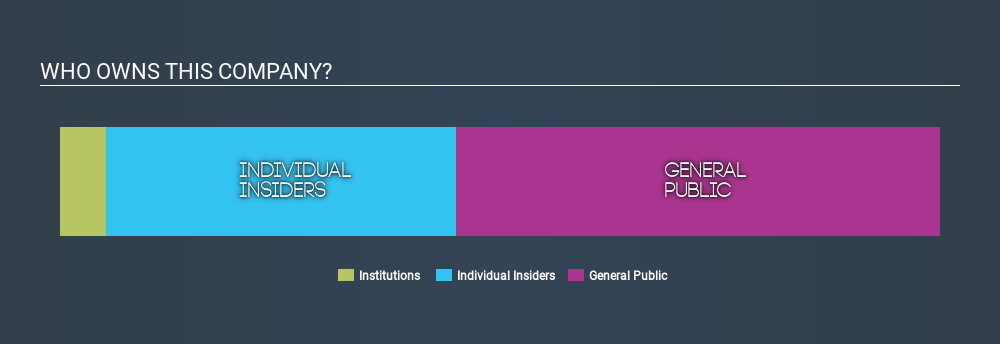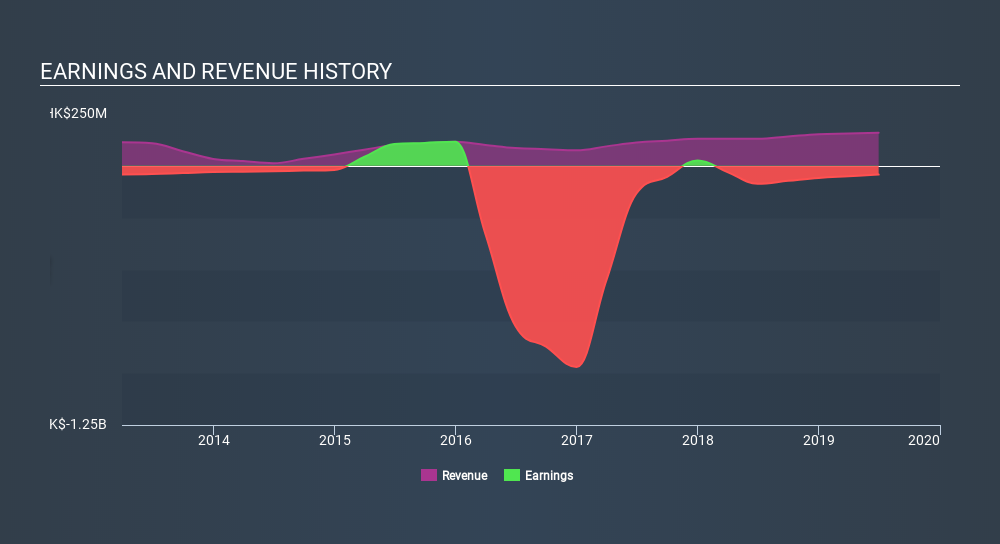- Hong Kong
- /
- Consumer Finance
- /
- SEHK:431
What Kind Of Investor Owns Most Of Greater China Financial Holdings Limited (HKG:431)?

If you want to know who really controls Greater China Financial Holdings Limited (HKG:431), then you'll have to look at the makeup of its share registry. Insiders often own a large chunk of younger, smaller, companies while huge companies tend to have institutions as shareholders. I generally like to see some degree of insider ownership, even if only a little. As Nassim Nicholas Taleb said, 'Don’t tell me what you think, tell me what you have in your portfolio.
With a market capitalization of HK$1.4b, Greater China Financial Holdings is a small cap stock, so it might not be well known by many institutional investors. Our analysis of the ownership of the company, below, shows that institutional investors have bought into the company. Let's delve deeper into each type of owner, to discover more about Greater China Financial Holdings.
Check out our latest analysis for Greater China Financial Holdings

What Does The Institutional Ownership Tell Us About Greater China Financial Holdings?
Institutional investors commonly compare their own returns to the returns of a commonly followed index. So they generally do consider buying larger companies that are included in the relevant benchmark index.
Greater China Financial Holdings already has institutions on the share registry. Indeed, they own 5.4% of the company. This implies the analysts working for those institutions have looked at the stock and they like it. But just like anyone else, they could be wrong. If multiple institutions change their view on a stock at the same time, you could see the share price drop fast. It's therefore worth looking at Greater China Financial Holdings's earnings history, below. Of course, the future is what really matters.

We note that hedge funds don't have a meaningful investment in Greater China Financial Holdings. Our data suggests that Kequan Liu, who is also the company's Top Key Executive, holds the most number of shares at 21%. When an insider holds a sizeable amount of a company's stock, investors consider it as a positive sign because it suggests that insiders are willing to have their wealth tied up in the future of the company. The second and third largest shareholders are Lam Yiu Chu and Dayong Yang, holding 10.0% and 8.9%, respectively. Interestingly, Dayong Yang is also a Member of the Board of Directors, again, indicating strong insider ownership amongst the company's top shareholders.
A deeper look at our ownership data shows that the top 5 shareholders collectively hold less than 50% of the register, suggesting a large group of small holders where no one share holder has a majority.
While studying institutional ownership for a company can add value to your research, it is also a good practice to research analyst recommendations to get a deeper understand of a stock's expected performance. Our information suggests that there isn't any analyst coverage of the stock, so it is probably little known.
Insider Ownership Of Greater China Financial Holdings
The definition of company insiders can be subjective, and does vary between jurisdictions. Our data reflects individual insiders, capturing board members at the very least. The company management answer to the board; and the latter should represent the interests of shareholders. Notably, sometimes top-level managers are on the board, themselves.
I generally consider insider ownership to be a good thing. However, on some occasions it makes it more difficult for other shareholders to hold the board accountable for decisions.
Our information suggests that insiders maintain a significant holding in Greater China Financial Holdings Limited. Insiders own HK$570m worth of shares in the HK$1.4b company. I would say this shows alignment with shareholders, but it is worth noting that the company is still quite small; some insiders may have founded the business. You can click here to see if those insiders have been buying or selling.
General Public Ownership
The general public, who are mostly retail investors, collectively hold 55% of Greater China Financial Holdings shares. This size of ownership gives retail investors collective power. They can and probably do influence decisions on executive compensation, dividend policies and proposed business acquisitions.
Next Steps:
While it is well worth considering the different groups that own a company, there are other factors that are even more important.
I like to dive deeper into how a company has performed in the past. You can find historic revenue and earnings in this detailed graph.
If you would prefer check out another company -- one with potentially superior financials -- then do not miss this free list of interesting companies, backed by strong financial data.
NB: Figures in this article are calculated using data from the last twelve months, which refer to the 12-month period ending on the last date of the month the financial statement is dated. This may not be consistent with full year annual report figures.
If you spot an error that warrants correction, please contact the editor at editorial-team@simplywallst.com. This article by Simply Wall St is general in nature. It does not constitute a recommendation to buy or sell any stock, and does not take account of your objectives, or your financial situation. Simply Wall St has no position in the stocks mentioned.
We aim to bring you long-term focused research analysis driven by fundamental data. Note that our analysis may not factor in the latest price-sensitive company announcements or qualitative material. Thank you for reading.
About SEHK:431
Greater China Financial Holdings
An investment holding company, engages in the industrial property development, general trading, securities brokerage, insurance brokerage, asset management, and loan financing operations in Hong Kong and the People’s Republic of China.
Moderate with imperfect balance sheet.
Market Insights
Community Narratives



